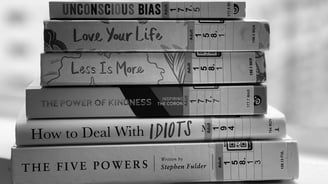Nonfiction Book Ghostwriting


Are you ready to write a nonfiction book? While I can help with most nonfiction titles, I specialize in helping my clients write memoirs, business books, and self help books.
Read below to get a little advice on how to write the best book you can in each area:


Memoirs: How to write a memoir
So, what makes a good memoir? How can you make your memoir, well, memorable?
The following are a few tips I have come up with from my own observations:
Plan your book. Sure, it's about your life, but what parts? Make sure to cover the overall course of your life, but you don't need to include every boring detail. Outline your book first and decide then what you will, and won't, cover. Your readers will thank you.
Don't be afraid to makes yourself look bad. Naturally, you are going to share your triumphs, but remember to share your mistakes and missteps, too. When your readers reads those, they will relate to you better because they too have had missteps. Heck, we all have. This will make your memoir stand out, which is not an easy task.
Don't be afraid to embarrass yourself. In a similar vein as the previous tip, feel free to include that story or time that makes you looks silly or foolish. Your reflex when writing your memoir will likely be to paint yourself in the best light possible, but try to tell both sides of you.
Include details, but not too much. This is the hardest kind of advice to give because it hinges on cultivating a sense of how much detail is too much, and slows the story down, and how too little detail keeps your reader at a distance. This area is something a skilled ghostwriter can help you with, ahem.
Name names, but feel free to change a few. You will hopefully always tell the truth as you see it, but feel free to change a few first names so as not to ruffle feathers you don't have to ruffle. Tell the truth, but be kind doing so.
Ready to write your memoir but thinking you might want some help or maybe you just have some questions?
Click the button below to book a quick chat:


Business books: How to write a business book
So, what makes a good business book? From what I have read and seen, good business books tend to contain or do the following:
Base your advice and tips on your own business experience. This might sound obvious, but the more your business book is derived from your own business experience, the more sound your advice will be and the more convincing your arguments will be. Stay in your lane, and let others write about the stuff you don't know about.
Feel free to brag, but also talk about your missteps. As when writing a memoir, while it's great to crow about your successes, if you only talk about your high points and ignore your failures, your tone will ring false. You made some mistakes along the way, so use those to teach your reader and to get them to root for you.
Don't slam others. Your business book is not the place to settle old scores. If you do have to use someone or some business as a negative example, see if you can change the name or at least talk about their mistakes without your own emotion getting in the way.
Have more than one point to make. Your business book should be more than a chance to brag about what a great success you and your business are. It should teach. So, before you sit down to write your book, make sure you have more than one principle or life lesson to share. Don't write a fluffy book that your readers will regret reading.
Know your audience, write well, be organized, etc. This last tip covers English 101 stuff, you know, the advice our English teachers gave us over and over about writing. This includes remembering to be aware of our audience, to draft an outline before writing, and to take your draft through more than one revision, and so on. This writerly stuff is what we ghostwriters specialize in, but if you choose to fly on your own, you will need to mind your Ps and Qs because no one else is going to.
Ready to write your business book and want to talk about next steps? Click the button below to set up a quick consult:


Self-help books: how to write the best self-help book
So, what makes a good self-help book? I think the following are good components to include:
Advice backed by personal experience and personal stories. Use your own experiences, as well as those of others you know, to illustrate your points. And stay in your lane. For instance, if you know a ton about finance and how to save for retirement, write about that, not how to lose weight (unless you're an expert there as well).
A logical flow. Your advice should introduce a general concept or principle but teach specific techniques or steps for your reader to follow. Remember, the most specific you are, the more helpful your advice is to your readers.
An easy, conversational style. No one wants to read a dry, data-filled textbook. Tell your story while you give advice, and be willing to talk about your own mistakes.
A narrative that is written to your audience. This means that you must first know who your audience is, their sex, their age range, their interests, hopes, fears, etc. The more you know your audience and the better you define who they are, the more likely your advice is going to resonate with them. If you are a young man in your twenties, don't try to write a self-help book for people going through a mid-life crisis. You get the idea.
Want to discuss your self-help book with me? Please click the button below to book a quick chat:

The Minneapolis Ghostwriter made my book-writing journey smooth and enjoyable. Highly recommend his services!
Paul Q

I never thought I could write a book. This ghostwriter truly guided me every step.
Ann W

★★★★★
★★★★★
Minneapolis Ghostwriter
Guiding you through your book-writing journey
© 2025. All rights reserved.
